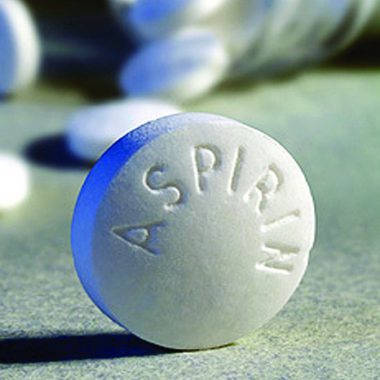GPs can advise people over 50 to take aspirin daily to help cut deaths from cancer, UK academics have claimed after carrying out a review of the latest evidence.
The researchers said that for people aged 50–65 years, taking a low daily dose of aspirin – between 75 and 100 mg – cut the risk of dying from cancer over the next 20 years.
People would need to take aspirin for five years or longer, but – at least for this age group – the benefits outweighed the risks from potential bleeding, according to the team.
The researchers said daily aspirin was the next best approach to preventing cancer for the population ‘after stopping smoking and preventing obesity’ but called for people to ask their GP before taking aspirin daily as ‘there are some serious side effects that can’t be ignored’.
However, leading GPs and experts in cancer research warned more evidence was needed regarding which patients should be targeted for aspirin prevention before GPs could advise people to start taking a daily dose.
The review – published today in the Annals of Oncology – was carried out by an international team led by Professor Jack Cuzick, from Queen Mary University of London, with backing from Cancer Research UK and the British Heart Foundation.
Overall, studies showed aspirin cut the risk of colorectal cancer deaths by around 40% over 10 years, and oesophageal and stomach cancer deaths by 35-50%.
The benefits were seen for aspirin 75-100 mg daily if taken for at least five years between the ages of 50 and 65; no benefit was seen for the first three years and death rates were only reduced after five years.
Related stories
Stop aspirin and consider newer anticoagulants, says NICE
GPs told to review aspirin use in patients with atrial fibrillation
Patients with atrial fibrillation ‘at risk’ from outdated aspirin prescribing practice
However, the risks of bleeding – particularly from the digestive tract – were significantly increased with daily aspirin use.
For example, in people aged 60 years taking daily aspirin increased the risk of gastrointestinal bleeds from 2.2% to 3.6%, although the authors say this would be potentially life-threatening in a small proportion (less than 5%).
Based on the evidence, the authors calculated that for average-risk people aged 50-65 years, taking aspirin daily for 10 years would cut the risk of cancer, heart attack or stroke by 7% in women and 9% in men over 15 years and lead to a 4% overall reduction in deaths over 20 years – almost entirely due to a reduction in cancer deaths.
They calculated that despite the increase in bleeding risk, for people in this age bracket the net benefit in reduction of deaths favoured treatment.
However, the review authors cautioned that it remains unclear what dose of aspirin is best to maximise the benefit-to-harm ratio, or whether taking aspirin longer than 10 years would result in greater benefits.
But lead author Professor Cuzick said he believed the benefits of daily aspirin would outweigh the harms for most people and the risk of bleeding could be assessed on an individual basis.
Professor Cuzick said: ‘Until our study, where we analysed all the available evidence, it was unclear whether the pros of taking aspirin outweighed the cons.’
‘Whilst there are some serious side effects that can’t be ignored, taking aspirin daily looks to be the most important thing we can do to reduce cancer, after stopping smoking and reducing obesity, and will probably be much easier to implement.’
He added: ‘The risk of bleeding depends on a number of known factors which people need to be aware of before starting regular aspirin and it would be advisable to consult with a doctor before embarking on daily medication.’
But GPs and other experts said it was still too soon to recommend people over 50 start taking aspirin.
Dr Andrew Green, chair of the GPC clinical and prescribing subcommittee, said the findings were ‘interesting’ but cautioned it would be difficult to convince individual patients of the benefits – particularly with the absence of clear information to weigh up the risks of nonfatal bleeding.
Dr Green said: ‘The difficulty, as always, is in applying changes in disease incidence within a population to the individual sat in front of us in surgery.’
He added: ‘It must also be remembered that in the real world only a minority of people have the discipline to comply with medication for a full 10 years, and as a population intervention the benefits will be less than those obtained in trials.’
Professor Willie Hamilton, professor of primary care diagnostics at the University of Exeter, said there was ‘not much difference’ between the latest research and a recent review by the National Institutes of Health Research, which drew less certain conclusions, and agreed GPs would find it difficult to start advising healthy people to take aspirin in practice.
Professor Hamilton said: ‘There’s not that much difference between the findings – just the interpretation is a bit more positive.’
Dr Julie Sharp, head of health information at Cancer Research UK, the charity is ‘funding a number of trials and research projects to make the picture clearer’.
Ann Oncol 2014; available online 6 August

Click here to find out more about our campaign
Visit Pulse Reference for details on 140 symptoms, including easily searchable symptoms and categories, offering you a free platform to check symptoms and receive potential diagnoses during consultations.

















